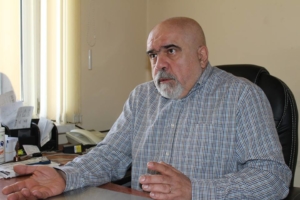Who will become MP and why
Photo: Lucy Sargsyan
Alexander Iskandaryan, political analyst, Director of the Caucasus Institute
The next parliament will be different. It will be plural and less oligarchic. The new parliament will try to be more professional, but it is less likely to manage it. It will differ from the previous one by its powers. It will be a center of decision-making, a place where people will try to reach a consensus.

Armenian citizens are now choosing the county’s major decision-making body. They are electing those who will rule. Before that, there was a presidential figure. This ballot is less personified. It’s much easier for people to vote for persons rather than for political parties, at least in our system, where democracy is rather young.
Forecasts
Given that parliament has been downsized, the competition has increased. The reason for this is not that the number of seats has been reduced [105 mandates, while there are 131 of them in the incumbent parliament], but rather that the first party will have to gain 54%. Judging by the present-day reality, the ruling Republican Party of Armenia (RPA) is going to gain more. And the second party will have to fit into the remaining mandates. It will most likely be the Prosperous Armenia Party (PAP), which will also get a considerable number of votes. And there will be almost nothing left for the rest of the parties.
That’s the setup the opposition has drawn on itself. First they insisted on removing the president, then they excluded voting through the majoritarian system. Whereas one person can’t get into parliament through the party lists. A party needs to get at least 5%, whereas a bloc – 7%. This creates serious competition. It’s quite obvious, who is going to be the first and who – the second. And the rest of the parties are at each other’s throats, since they realize that, unlike last time, many will be left outside.
The rules of the game
A system of parliamentary election game rules is gradually shaped from the last cadence. In the past, the opposition forces used to say that everything was illegitimate: “The president is illegitimate, the parliament is illegitimate, the Constitution is illegitimate, the elections are illegitimate, everything is rigged, and I oppose all that from the street.” Whereas now, they are saying: ‘The president is illegitimate, the parliament is illegitimate, the Constitution is illegitimate, the elections are illegitimate, everything is rigged, but I will be elected, I will get into parliament and I will say how illegitimate everything is, turning into one of the segments of this consensus.” It’s a fundamentally different situation and the electorate can’t help but see that.
In addition, unlike all elections held before 2008, no one, except for the Republican Party, is going to get the majority of votes now. Everyone understands that they simply don’t have such an opportunity. They only lay claims to being the main opposition, true opposition, real opposition, honest opposition, beautiful opposition, intelligent opposition etc., which is termed as ‘accepting the rules of the game.’
There won’t be a second round. It’s a classic situation; people are simply embarrassed to say that they are going to vote for the Republicans [the ruling party]. It’s a different type of voting. Some parties have their adherents, their own electorate, and some of them are quite stable, such as that of the Armenian National Congress (ANC), ARF-Dashnaktsutyun, the Communist Party and the Prosperous Armenia Party. But it’s different with the Republicans. There is a certain number of officials and businessmen who, for some personal considerations, will vote for the RPA. In addition, people will vote for the RPA in extremis, when they feel that there is no one else to vote for.
Ideology cedes to non-ideological incentives
There is an ongoing process in Armenia, where the forces lacking ideology are winning over the ideological ones. It is fair to say that this is not only an Armenian but a global process. The times of heavy ideological battles are over. In case of management of apathy, people tend to vote not for words, but rather for the road built in a village, for doors or windows installed in a house, for a salary; they tend to vote depending on affiliation of their employer to this or that party, depending on the area of residence.
The ideology is diminishing and, as a result, such parties as ARF-Dashnaktsutyun and the Armenian National Congress are losing their electorate, whereas the Republicans, on the contrary, are developing; Tsarukyan’s party [meaning the Prosperous Armenia Party, led by business tycoon, Gagik Tsarukyan] is growing.
Meanwhile, who do the opposition ideological parties say? ‘They are bad-I’m good!’ No one believes that as it has been said for the past 25 years. People believed it in 2008. People were ready to go out, vote and expose themselves to danger. Nobody believes it now. That’s exactly the rationalization of voting.



















